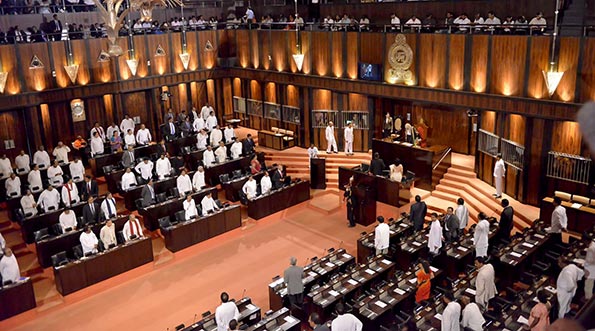Middle-East instability could affect Sri Lanka

Prime Minister Ranil Wickremesinghe yesterday warned that ISIS actions could trigger economic instability in the Middle East in 2016 with adverse repercussions on Sri Lanka’s economy emerging from it. Sri Lanka was hence planning to seek an IMF Standby Facility as a contingency measure against any adverse fallout on our economy from instability in the Middle Eastern region, he told Parliament.
Participating in the debate on the second reading of the Appropriation Bill, the Premier predicted massive global economic instability next year.
“Economic growth rates of all countries except for the US have slowed down and Sri Lanka too has felt the effect. Owing to the actions of ISIS there could be economic instability in the Middle East and Sri Lanka will feel the impact directly. He added, having taken this situation into consideration he had instructed the Finance Minister to work towards a Standby Facility with the IMF to pre-empt any negative impacts on our economy,” he said.
He added, the daily income of 43% of Sri Lanka’s population is less than two US dollars. “This is a poor nation and that is the bitter truth despite all embellishments and decorations we are having before our eyes. We need to change this situation. We need to help our people enjoy the dividends of economic development. We are on the threshold of a new journey. The budget proposals have been designed to facilitate our journey forward. But there are forces which do not want to see a change in the social status quo. This resistance to change that we see in the minds of some people was clearly visible in the reactions when the President presented his policy speech on 1 September, when I presented the mid-term economic policy on 5 November and when the Finance Minister presented budget proposals on 20 November,” the Prime Minister added.
“We do not harbour any animosity against those who oppose our views, but sooner or later they too will have to open their eyes to the truth before us. That is inevitable. Opposing change without any scientific or logic- based inquiry is something very natural in our politics. Take for example the opposition against plans to amalgamate the monies in the ETF and the EPF. The main reason for the proposal to amalgamate these two funds was that massive swindling took place during the Mahinda Rajapaksa tenure. When workers stood against it, the government suppressed them by shooting at them. In such an incident a youth by the name of Roshen Chanaka was killed. So the funds we are dealing with are blood stained.”
He added that there is no legal security for the monies in the EPF or ETF. Section 05 of the EPF Act says that the Monetary Board may invest such percentage of the moneys in the Funds as are not immediately required for the purposes of this Act in such securities as the Board may consider fit and may sell such securities. Accordingly there is no guarantee of the safety of those monies.
“When we inquired about the opinion of the trade unionists with regard to the amalgamation of the monies of the EPF and the ETF they suggested that it was more suitable to have two different funds and the management of the monies of the EPF should continue under the control of the Central Bank. There were further suggestions that the matter should be referred to the Governor of the Central Bank and the head of the EPF. Their decision would be conveyed to the trade unions and a final decision would only be taken with the approval of the Cabinet of Ministers and Parliament.”
(Source: Ceylon Today – By Gagani Weerakoon and Skandha Gunasekera)
Latest Headlines in Sri Lanka
- 12th International Meeting on Security Matters: High-Ranking officials convenes in Saint Petersburg April 24, 2024
- Uma Oya Development Project inaugurated April 24, 2024
- Damitha Abeyratne and husband granted bail April 24, 2024
- Maithripala Sirisena barred from SLFP chairmanship until trial ends April 24, 2024
- Iranian President Dr. Ebrahim Raisi arrives in Sri Lanka April 24, 2024


